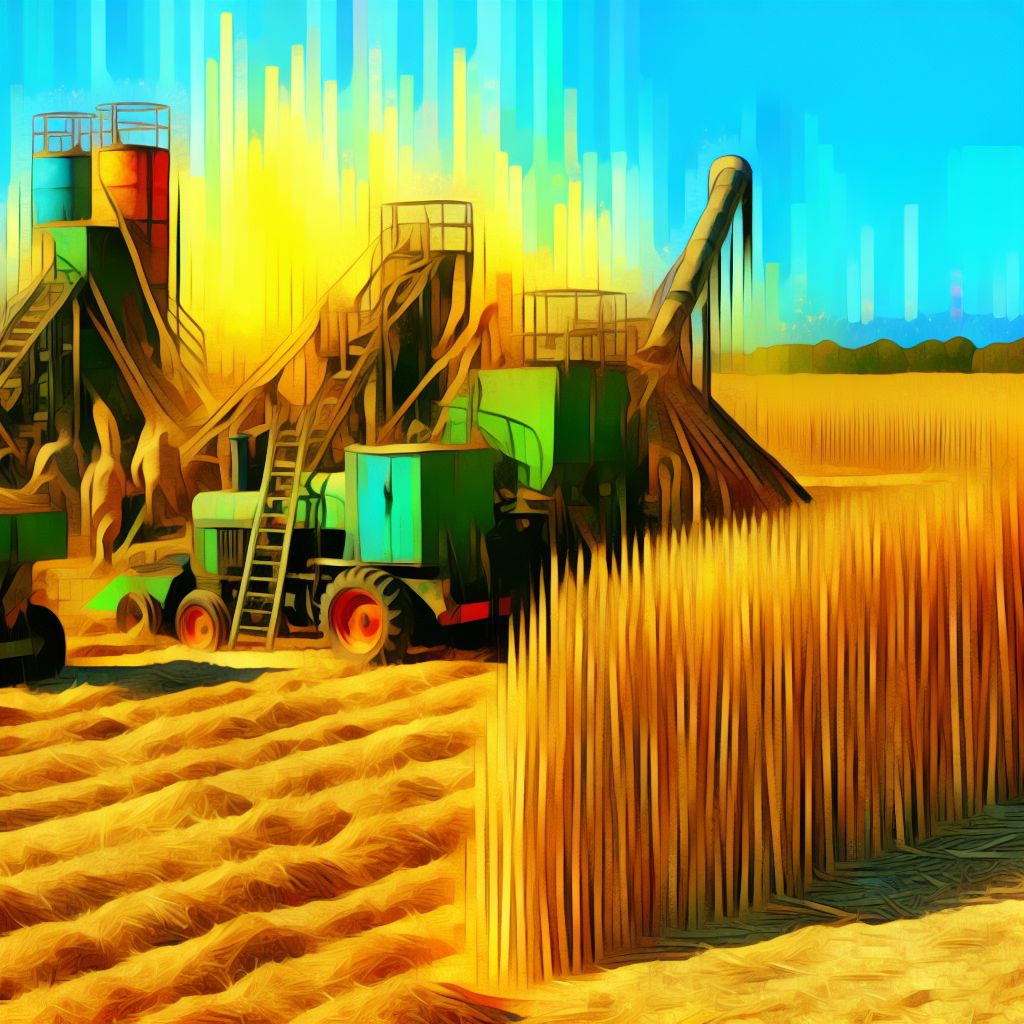Deutsch: Landwirtschaftliche Industrie / Español: Industria Agrícola / Português: Indústria Agrícola / Français: Industrie Agricole / Italiano: Industria Agricola
The agricultural industry in the industrial context encompasses a vast and diversified sector that is fundamental to the global economy, providing the primary means for food production, raw materials, and increasingly, biofuels. This industry is not only about the cultivation of crops and livestock farming but also includes a range of activities, technologies, and businesses that are involved in the production, processing, and distribution of agricultural products.
General Description

The agricultural industry is characterized by a wide array of production practices, from small-scale family-owned farms to large-scale industrial agricultural operations. These practices are supported by advancements in agricultural technology, including mechanization, the use of chemical fertilizers and pesticides, genetically modified organisms (GMOs), and sophisticated irrigation systems, all aimed at enhancing crop yield, efficiency, and profitability. The sector is also seeing a growing emphasis on sustainable and organic farming practices as a response to environmental and health concerns related to conventional farming.
Application Areas
- Crop Production: Cultivation of crops like grains, vegetables, fruits, and nuts, which are essential for human consumption and animal feed.
- Livestock Farming: Rearing of animals such as cattle, poultry, pigs, and sheep for meat, dairy products, and eggs.
- Agri-tech: Development and application of technologies to improve aspects of farming, from crop monitoring and animal health to weather forecasting and resource management.
- Agricultural Equipment: Manufacturing and supply of machinery and tools for planting, harvesting, and processing crops, as well as for managing livestock.
- Agrochemicals: Production of fertilizers, pesticides, and herbicides that support plant growth and protect crops from pests and diseases.
- Food Processing: Transformation of raw agricultural products into food items and beverages through processes like canning, freezing, and packaging.
Challenges and Risks
The agricultural industry faces numerous challenges, including climate change, which impacts weather patterns and water availability; market volatility, affecting prices and demand; and issues related to land use, such as deforestation and soil degradation. Additionally, there is growing concern over the sustainability of intensive farming practices and their effects on the environment and human health. Addressing these challenges requires innovation, policy intervention, and a shift towards more sustainable and efficient practices.
Importance of Sustainability
Sustainability has become a critical focus within the agricultural industry, driving efforts to reduce environmental impact, improve resource use efficiency, and ensure food security for a growing global population. Sustainable practices include precision farming, integrated pest management, conservation tillage, and the promotion of biodiversity.
Summary
The agricultural industry is a cornerstone of the global economy, vital for feeding the world's population and providing raw materials for various sectors. It is a complex and evolving field that incorporates traditional farming practices with cutting-edge innovations to meet the demands of modern society while facing global challenges such as climate change and sustainability. As the industry moves forward, balancing productivity with environmental and social responsibility remains a paramount concern, requiring ongoing adaptation and innovation.
--
Related Articles to the term 'Agricultural Industry' | |
| 'Agriculture industry' | ■■■■■■■■■■ |
| Agriculture industry: The agriculture industry in the industrial context refers to the comprehensive . . . Read More | |
| 'Agriculture and farming' | ■■■■ |
| Agriculture and farming in the industrial context refers to the large-scale cultivation of crops and . . . Read More | |
| 'Farming sector' | ■■■■ |
| Farming sector: The farming sector in the industrial context refers to the segment of the economy devoted . . . Read More | |
| 'Crop Production' | ■■■ |
| Crop Production in the industrial context refers to the large-scale cultivation of plants for food, fiber, . . . Read More | |
| 'Modern agriculture' | ■ |
| Modern agriculture in the industrial context refers to the application of technological advancements, . . . Read More | |
| 'Fodder' | ■ |
| Fodder in the industrial context refers to food grown or produced specifically for the feeding of domesticated . . . Read More | |
| 'Intensive farming' | ■ |
| Intensive farming in the industrial context refers to agricultural practices designed to maximize productivity . . . Read More | |
| 'Irrigation' | ■ |
| Irrigation in the industrial context refers to the controlled application of water to crops, landscapes, . . . Read More | |
| 'Agricultural Machinery' | ■ |
| Agricultural Machinery: Agricultural machinery in the industrial context refers to the wide range of . . . Read More | |
| 'Food production industry' | ■ |
| Food production industry: The food production industry in the industrial context encompasses the entire . . . Read More | |
